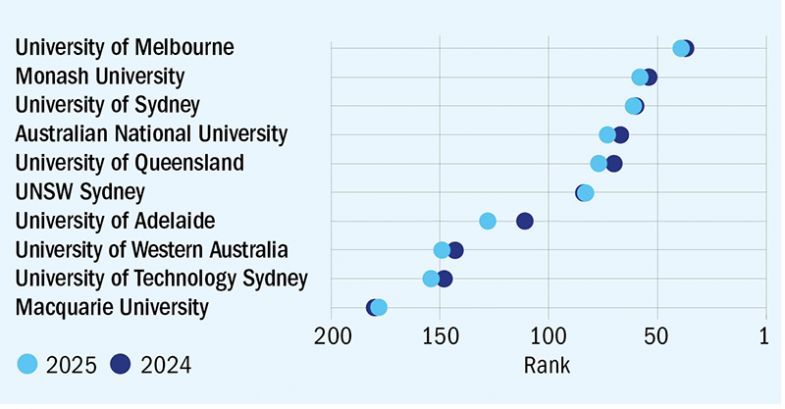Browse the full results of the World University Rankings 2025
Australian higher education stands on the brink of a long-anticipated dive in its international standing, after almost half the sector went backwards in this year’s Times Higher Education World University Rankings.
Seventeen of Australia’s 38 assessed institutions lost ground this year, including the five best-ranked universities. Seven recorded their worst results in at least nine years, while just four moved up the league table.
The average ranking of Australian universities declined by five places. Their mean scores fell by 0.2 points compared with an average increase of 0.5 points worldwide.
RMIT University rankings expert Angel Calderon said Australia’s “sobering” downturn had mainly been driven by declining scores in THE’s reputation surveys. He warned of worse to come, as the furore around international enrolment caps was likely to influence the results of the next poll.
“If this debate continues, I think a few people will basically be feeling less sympathetic towards Australia,” he said.
Change in ranking position of Australia’s top 10 universities, 2024-25

Dr Calderon said the results also reflected the pandemic’s impact on universities’ financial health. “Australia has done really well for many years, but the years in which [it] was the shining star probably have gone past.”
Phil Baty, THE’s chief global affairs officer, said Australian universities were also losing ground in international research collaboration and overseas recruitment – areas of traditional strength. Australian institutions suffered slight declines this year in their average scores for international students, staff and co-authorship, following steeper falls last year in the student and authorship metrics.
“International student caps…may further erode income for some top institutions [and] diminish Australia’s world-leading reputation as an open and internationally facing sector,” Mr Baty warned.
Consultant Justin Bokor said Australian universities’ rankings were likely to continue deteriorating. “You can have a high-performing higher ed sector, a low call on the public purse, or capped international student numbers,” he said. “You can’t have all three.
“A high-performing higher ed sector costs a lot of money, and if you can’t subsidise it through international education and you want to cap the public purse, then you lose performance over time.”
Mr Bokor said the rankings data mostly reflected conditions two years earlier. Australian universities had benefited in 2021 from an extra A$1 billion (£520 million) in research funding and the divestment of their shares in education services giant IDP. But by 2022 these sugar hits had waned, with 27 institutions reporting deficits.
Coronavirus impacts, ironically, also favoured Australian universities’ recent rankings performance. The “research income” metric – the average grant earnings of each academic – was inflated by mass retrenchments of university staff early in the pandemic, while relatively high exchange rates in 2021 and early 2022 also enhanced Australia’s income measures.
To some, a dip in Australia’s international rankings matters little when the federal government is intent on capping overseas student numbers. But Dr Calderon said rankings had “a bigger market than just students”.
Mr Bokor said rankings were markers of “prestige” with implications for universities’ ability to recruit high-calibre staff, build partnerships and establish offshore operations. “It’s not just recruitment, it’s across the board.”
He said rankings performance featured in most university leaders’ key performance indicators. “Vice-chancellors will say, ‘We shouldn’t be so obsessed with rankings.’ They say that when they’re happy with their position.”
Register to continue
Why register?
- Registration is free and only takes a moment
- Once registered, you can read 3 articles a month
- Sign up for our newsletter
Subscribe
Or subscribe for unlimited access to:
- Unlimited access to news, views, insights & reviews
- Digital editions
- Digital access to THE’s university and college rankings analysis
Already registered or a current subscriber? Login









